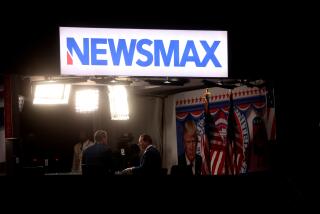Comparator to Get Off Lightly, Sources Say
Comparator Systems Corp., the Newport Beach company that was at the center of a major stock market scandal, has reached a settlement with government regulators in which it will pay no fines and can continue to operate, sources said Wednesday.
Under the terms of the agreement, two of the company’s top executives--Chief Executive Robert Reed Rogers and Vice President Gregory Armijo--have agreed to no longer serve as officers or directors of any public company, sources said. The men also agreed to sever any employment ties with Comparator after a period of time, and they need not admit any wrongdoing.
But Rogers, 67, has already resigned, and neither executive will be required to pay any fines. Comparator itself faces no penalties, sources said, other than to agree to abide by securities laws.
One source said that the company will have to restate its balance sheet and get Securities and Exchange Commission approval before it can issue any new stock.
That means the controversial maker of electronic fingerprint scanners is free to continue to operate even though the SEC had accused Comparator in a civil suit of being an outright fraud that lied about its finances, stole its technology and bilked investors out of millions of dollars by issuing mountains of worthless stock.
“We’re pleased to be able to have the matter resolved so that the company is not involved with any further time or expense in this matter,” said Gerald E. Boltz, an attorney who represented the company and the two executives. He declined to discuss specifics of the settlement.
The settlement is believed to have been signed by Judge Lourdes Baird in U.S. District Court in Los Angeles on Tuesday, but the settlement documents were not yet available to the public. SEC officials declined to comment on the case.
The company still faces lawsuits filed by stockholders. Still, the settlement of the SEC case caps a bizarre and complex chain of events that attracted national media attention and thrust the virtually unknown company under the microscope of stock market regulators.
The SEC zeroed in on Comparator after its stock shattered trading records and soared thirtyfold in value on the Nasdaq Stock Market in early May. Investigators soon found themselves confronting a case that involved stock-touting on the Internet, allegations of theft of a fingerprint scanning device from a professor in Scotland and the critical testimony of a former Comparator corporate secretary who was accused by the company of embezzlement and had gone on to appear in a pornographic film.
Comparator had never posted a profit in its 17 years as a public company, and its sales had usually been dismal. But the company survived by issuing hundreds of millions of shares of stock. The company used the stock to pay employees’ salaries, for legal services and even dental work.
By the time Comparator appeared on regulators’ radar, the company had issued more than 610 million shares of stock, more than such giants as Microsoft or IBM.
The rapid rise and subsequent fall of the stock on three days in early May became an embarrassment to regulators. Shortly thereafter, the National Assn. of Securities Dealers, which oversees the Nasdaq market, launched an extensive review of its trading requirements.
The company was removed from the Nasdaq market in June, and since then, its stock has traded for pennies in private, off-market transactions.
More to Read
Sign up for Essential California
The most important California stories and recommendations in your inbox every morning.
You may occasionally receive promotional content from the Los Angeles Times.









